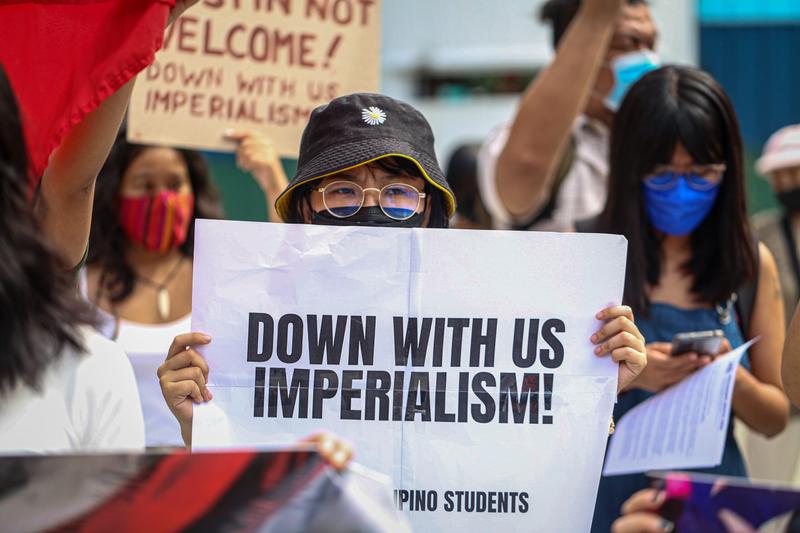Progressives are sounding the alarm over the visit of United States Defense Secretary Pete Hegseth to the Philippines, claiming that it “undermines Philippine sovereignty” and “advances US interests” in the region.
According to the Center for People Empowerment in Governance (CenPEG), Hegseth’s visit to the country represents a “growing trend” of militarization, which “undermines national sovereignty and security.”
“Foreign military forces should not dictate our national security policies or compromise our territorial integrity,” said CenPEG chair Roland Simbulan. “Standing up to assert our national sovereignty is necessary when foreign interests create artificial islands in our territory, destroy our marine habitat to create a military base on our shoals, and deny our fishermen of their livelihood.”
Hegseth and Ferdinand Marcos Jr. are expected to discuss deterrence in the South China Sea. The Philippines is Hegseth’s first stop in his “Indo-Pacific” tour which also includes Japan.
In the past three years, Marcos Jr. has been accommodating with US military interests especially in regards to China. Despite his claim that “diplomacy” is the only way of settling the maritime dispute in the South China Sea, he has also signed off on increased US military presence in the area, including additional military bases via the Enhanced Defence Cooperation Agreement, the Bilateral Defense Guidelines, and resuming the Balikatan joint military exercises.
Progressive groups have long lambasted the Balikatan exercises as harmful to the Filipino people. Regardless, 10,000 US troops are expected to participate in this year’s exercises alongside troops from the Philippines, Australia, Japan, Canada, France, South Korea, and the United Kingdom.
For the National Democratic Front of the Philippines, Hegseth’s visit is a clear signal from the US. In their statement, they called the visit a “calculated move in Washington’s ongoing campaign to contain and provoke China, setting the stage for an inevitable escalation of conflict that will drag the Philippines into a war that ultimately serves US interests.”
The revolutionary coalition noted that Hegseth’s arrival coincided with the start of the Silaknib joint military exercises in Nueva Ecija, with 3,000 Filipino soldiers and 2,000 US troops participating. According to the NDFP, these exercises, along with the upcoming Balikatan exercises April 21 to May 9, are meant to “[advance] US warfighting capabilities and [establish] a permanent military foothold in the Indo-Pacific.”
They also pointed out that the focus of the upcoming Balikatan exercises “has shifted towards showcasing greater military firepower,” with the Armed Forces of the Philippines set to showcase materiel bought from US allies Israel, South Korea, and France as part of its modernization program.
The NDFP asserted that US support to AFP modernization is meant to “transform the AFP into an auxiliary force of the US military in the event of an all-out war with China” while also “further entrench[ing] US control over the country’s defense.”
Who is Pete Hegseth?
In the two months since the beginning of Donald Trump’s second term, Hegseth has been at the center of multiple questionable foreign policy decisions. His visit to the NATO Defense Ministers meeting in Belgium last February saw him rule out a possible Ukraine membership to NATO as “unrealistic.” Trump himself would have a falling out with Zelensky after he called the Ukrainian President “insincere and unwilling” to achieve peace.
Hegseth would land himself in hot water once again just days before his Indo-Pacific tour, after accidentally leaking tactical military plans on the US’ operations against the Houthis in Yemen. The Atlantic reported that Hegseth accidentally added their editor-in-chief to a Signal group chat two hours before the military operations were to take place.
The leaked chats also revealed that Hegseth and US Vice President JD Vance shared little esteem for their European allies. Messages from Vance showed dismay at having to “[bail] out Europe again.” Hegseth agreed, calling their European allies “pathetic” for “free-loading” off of the US military.
The US is striking against the Houthis due to their ongoing campaign to attack all ships crossing the Red Sea that are “connected to Israel” as part of their opposition to Israel’s genocide in the Gaza strip. The blockade has forced global shipping monopolies to suspend shipments through the Red Sea, with Israel’s Port of Eilat in the Red Sea declaring bankruptcy last July 2024. The Suez Canal has also reported losses of up to $6 billion since the start of the blockade.
Redrawing the battle lines?
Political analysts have described Trump’s alienation of “traditional” US allies as detrimental but also in line with his nationalist policies. NBC News reported that US allies like Colombia are “increasingly hedging their relations with Russia and China” and that more nations “may rethink their ties to the United States.”
The same might be true in the Asia-Pacific. Last March 22, Chinese, South Korean, and Japanese diplomats met in Tokyo to discuss “security and economic issues” despite concerns on China’s support of North Korea, military activity near Taiwan, and support for Russia against Ukraine. South Korea is also notably not part of Hegseth’s itinerary, possibly signalling a shift in US priorities in the region.
In the Philippines, groups continue to call for a “truly independent foreign policy.” CenPEG explains that the Philippine government should “[prioritize] diplomacy, peace, and regional cooperation over foreign military engagements.”
Simbulan warned that allowing further militarization in Philippine waters undermined national sovereignty and security. “Our nation is being drawn into the geopolitical rivalries of major powers, and it is the Filipino people who stand to lose the most,” said Simbulan. “Whether it be the United States, China, or Russia, foreign military forces should not dictate our national security policies or compromise our territorial integrity. Standing up to assert our national sovereignty is necessary when foreign interests create artificial islands in our territory, destroy our marine habitat to create a military base on our shoals, and deny our fishermen of their livelihood.”
“Instead of allowing foreign military installations that do nothing to address our people’s urgent needs, our government should redirect resources toward long-term development programs that uplift Filipino lives,” said Simbulan. He urged policymakers to focus on inclusive development, employment generation, and improving the well-being of Filipinos, instead of military build-ups that “only serve external interests.”
The NDFP likewise affirmed the commitment of revolutionary forces against “the continued subjugation of the Philippines to US military interests.” In a statement, the group called for the “rejection of all US military agreements, the removal of foreign troops and bases, and an end to the use of the country as a pawn in a brewing inter-imperialist war.”



